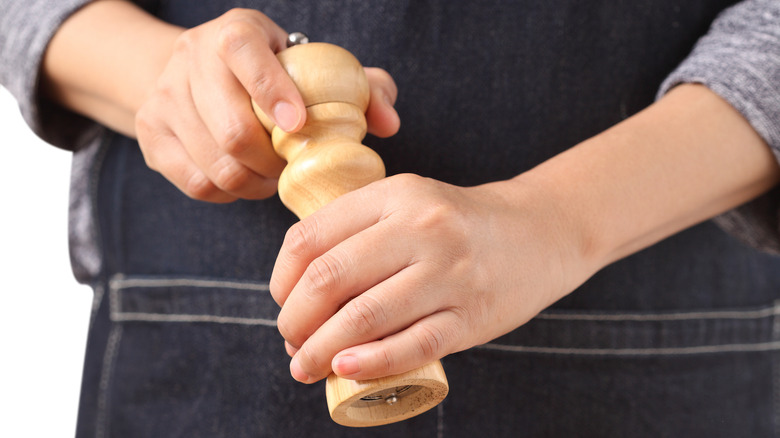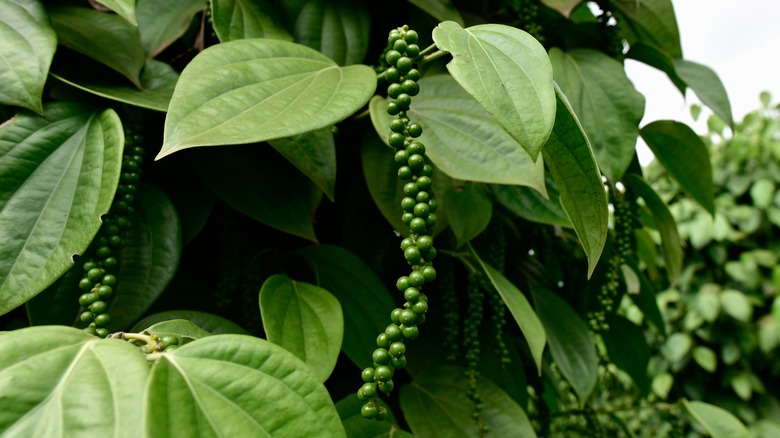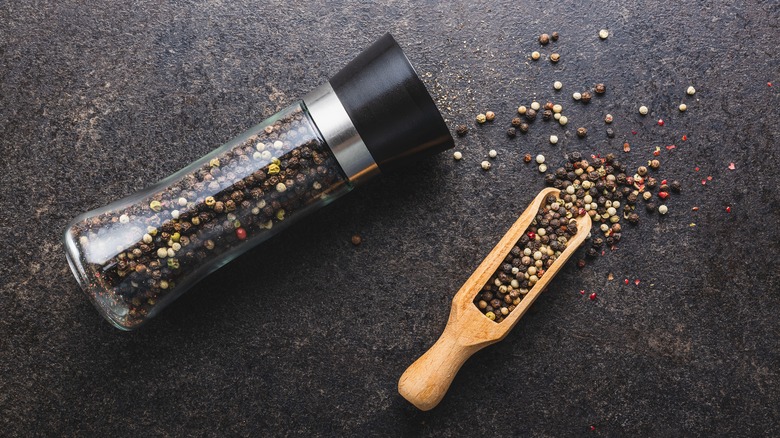Here's Why You Should Start Grinding Your Own Pepper
We may receive a commission on purchases made from links.
Black pepper is a pantry staple and the most popular and fundamental spice worldwide (via ScienceDirect). Not only does it add flavor and heat to recipes, but the alkaloid piperine present in black pepper, as Healthline reports, also has myriad health benefits, including an ability to help fight bacteria and certain types of infections. Adding black pepper to your food can boost the bioavailability of its nutrients and stimulate acid production in the stomach allowing for better digestion (via WebMD). According to Dr. Michael Greger, adding black pepper to your Golden Milk will activate turmeric's anti-inflammatory properties by 2,000% (via NutritionFacts.org).
Peppercorns, which are technically a fruit, are grown in tropical areas around the world, according to Farmer's Almanac. They start as green clusters on the plant and turn black after being picked and sun-dried. The same plant that produces black peppercorns also produces the white, green, and red varieties you may see at specialty markets.
The benefits of using freshly ground pepper
As soon as foods are exposed to oxygen, they oxidize and break down (via Kemin). This oxidation causes black pepper to lose flavor after being exposed to oxygen post-grinding.
Not only does pepper lose its potency and flavor after grinding, but Harold McGee, the author of "On Food and Cooking," as quoted in a New York Times article, states that grinding the peppercorns "frees their aromatics to evaporate, so the most and freshest flavor comes from whole peppercorns ground directly into the preparation." This fresh flavor is what pairs well with a balsamic and black pepper strawberry salad.
We all know what has us reaching for that giant container of pre-ground pepper — convenience. It's simply easier to measure. There's a hack designed to help you accurately measure fresh ground pepper, thanks to author Julia Turshen, author of "Small Victories: Recipes, Advice + Hundreds of Ideas for Home Cooking Triumphs." Take your favorite pepper grinder, place a bowl underneath, and count the rotations. Measure the output, and you'll know exactly how many turns it takes to produce a measured amount. You can record the number of rotations (i.e., one teaspoon equals x number of turns) on a card and keep it handy on your fridge or inside the door of a kitchen cabinet.
Storing peppercorns
A good quality grinder will allow you to adjust the coarseness of the peppercorn to your personal preference, whether you're grinding pepper for a recipe or bringing it to the table for a meal. Invest in a good peppermill, such as the one Ina Garten swears by, and see if you can tell the difference in freshness.
It's crucial to store peppercorns properly to keep them fresh for use. According to Masterclass, peppercorns should be stored in an airtight container or directly in the pepper mill to maintain their freshness and flavor. In more humid climates, you might want to keep them in the refrigerator or another temperature-controlled location, as the peppercorns tend to get soft in damp environments.
Now that you know how to get the most flavor out of black pepper, it's time to put it to the test in one of your favorite recipes. Spicy bacon and black pepper baked beans, anyone?


